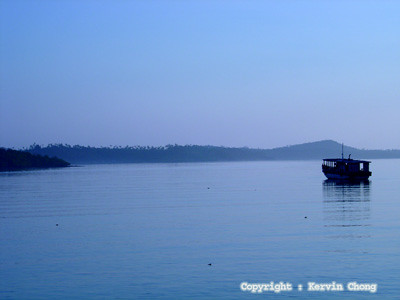Life on an island
A blue morning before the sun rises as the fishing boat heads off to sea, Banggi, Sabah, 2005.
Life on a small island can be simple indeed. The rhythm of your daily life revolves around night and day; waking and sleep; work and home. Many city dwellers would take time to reset their biorhythm to the pace of village folks and some never truly shed the hectic pace of the city to fit in. The generator is the best indicator of time, you wake at 6 a.m. to find the last sputter of life and soon the air is still and every appliance that depends on this lifeblood slowly falls into a stupor. Half the day will be like this, devoid of the everyday conveniences that many others take for granted, electric current. Children wake up and soon get dressed in their uniforms and rush out to catch a ride on the trucks taking them into the interior where their school is located; others are not so fortunate and would have to face a boat ride on a wooden sampan to reach their destination. The womenfolk have been up since dawn and the aroma of stoves fills the air with the whiff of breakfast while the men all get ready for another day of arduous work, either fishing or farming.
The day is quite laid back, after work the noon day sun will force even the best of men to seek shelter and rest their tired shoulders, some find solace in a quick nap while others tuck into home prepared meals, some rice, boiled vegetables and maybe the day’s catch if they’re lucky. The coffee shop is a focal point of community life, escaping the hot interior of their houses, those without work find time to sit themselves on a table, order a cold drink and make time with neighbours to hear gossip and news. The sea breeze carries along their cool breeze to give some measure of comfort to sweating patrons, its no wonder that many of the tables are set in the open since fans are not available. The day soon winds down and the routine reverses, the trucks are all back to pick up the people disembarking from the Kudat Express, a ferry that is the only contact the villagers have with the mainland (in the form of the town of Kudat). The children return, greeted by mothers resting on the veranda after a busy day of housework and the men folk return from the sea with the day’s catch. The generator soon sputters to life at 6 p.m. and the hum of machinery and illumination of lights are present again.
Absent television displays their content, some are even more advanced for the fact that they have Astro installed even if there is no current throughout the day. People seem to have a passion for karaoke as the air is filled with the voices of aspiring singers, good and bad. It seems they are not so technologically lagging as we thought at first. The coffee shop retains its role during the night, makeshift stalls start selling treats like goreng pisang (banana fritters), lekor (fish meat fritters) and air batu campur (shaved ice with various toppings). Fresh fish are in abundant and soon end up in the grill to make the cheap but enjoyable ikan bakar (grilled open fire fish). Now it’s the men folk’s turn to chat away and they congregate at the coffee shops and talk about the day’s events accompanied by a hearty dinner, maybe some nasi goreng (fried rice) or mee sup (soupy noodles).
The cycle soon comes to an end as tired souls return to catch up on sleep only to be waken the following day as the generator once more falls silent. Thus is Banggi (you can find it just above the northern most tip of Sabah).
The day is quite laid back, after work the noon day sun will force even the best of men to seek shelter and rest their tired shoulders, some find solace in a quick nap while others tuck into home prepared meals, some rice, boiled vegetables and maybe the day’s catch if they’re lucky. The coffee shop is a focal point of community life, escaping the hot interior of their houses, those without work find time to sit themselves on a table, order a cold drink and make time with neighbours to hear gossip and news. The sea breeze carries along their cool breeze to give some measure of comfort to sweating patrons, its no wonder that many of the tables are set in the open since fans are not available. The day soon winds down and the routine reverses, the trucks are all back to pick up the people disembarking from the Kudat Express, a ferry that is the only contact the villagers have with the mainland (in the form of the town of Kudat). The children return, greeted by mothers resting on the veranda after a busy day of housework and the men folk return from the sea with the day’s catch. The generator soon sputters to life at 6 p.m. and the hum of machinery and illumination of lights are present again.
Absent television displays their content, some are even more advanced for the fact that they have Astro installed even if there is no current throughout the day. People seem to have a passion for karaoke as the air is filled with the voices of aspiring singers, good and bad. It seems they are not so technologically lagging as we thought at first. The coffee shop retains its role during the night, makeshift stalls start selling treats like goreng pisang (banana fritters), lekor (fish meat fritters) and air batu campur (shaved ice with various toppings). Fresh fish are in abundant and soon end up in the grill to make the cheap but enjoyable ikan bakar (grilled open fire fish). Now it’s the men folk’s turn to chat away and they congregate at the coffee shops and talk about the day’s events accompanied by a hearty dinner, maybe some nasi goreng (fried rice) or mee sup (soupy noodles).
The cycle soon comes to an end as tired souls return to catch up on sleep only to be waken the following day as the generator once more falls silent. Thus is Banggi (you can find it just above the northern most tip of Sabah).




No comments:
Post a Comment